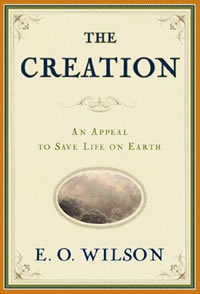Book Notes
 E.O. Wilson, The Creation; An Appeal to Save Life on Earth (New York: W.W. Norton, 2006), 175pp.
E.O. Wilson, The Creation; An Appeal to Save Life on Earth (New York: W.W. Norton, 2006), 175pp.
Harvard's renowned entomologist E.O. Wilson was born (1929) in Alabama and raised in the evangelical faith of the Southern Baptists, a faith that he rejected long ago in favor of what in this book he calls "secular humanism." So there is a personal history behind his decision to craft this book as a long letter written to a fictional pastor, asking the pastor to set aside their important differences in order to join forces in a common cause. The stakes are high, for "the fate of the Creation is the fate of humanity," he writes, and right now creation is in deep distress. As the two most powerful forces in society, he says, religion and science can act as a tremendous force for good.
To the extent that religion neglects the earthly present in order to emphasize a heavenly future, and as a consequence abuses creation, Wilson blames faith for many of our environmental woes; and his history of humankind reads something like a long, slow march from superstition due to religion to liberation thanks to science. But he is just as wary of scientific and technical optimism as he is of religious pessimism. Such "exemptionalism" that denies our environmental crisis is what he fears most.
Whereas the earth's genetic heritage has taken tens of millions of years to evolve, our cultural heritage has developed swiftly with catastrophic consequences. Earth's biodiversity is vanishing at an astonishing pace due to the destruction of habitats, global warming, the spread of alien species, pollution, and over-population. And this is only what we do know. "We don't know what is happening to most of the rest of life, because we don't even know what it is. We don't need a moon base or a manned trip to Mars. We need an expedition to planet Earth, where probably fewer than 10 percent of the life forms are known to science, and fewer than 1 percent of those have been studied beyond a simple anatomical description and a few notes on natural history."
Across seventeen very short chapters Wilson sketches why and how this has happened, along with the projected consequences for our failure to act. He also laments current science education and suggests how we can improve it. I especially enjoyed his personal anecdotes, how, for example, he recalled his first microscope at the age of eight, and three important university mentors who bequeathed to him a passion for science. If various news reports are accurate, at long last the evangelicals that Wilson left long ago are beginning to get the message about the environmental crisis and joining scientists like him in what he calls in his last chapter an "alliance for life." If true, and let us hope that it is, that would be good news about the Good News.


